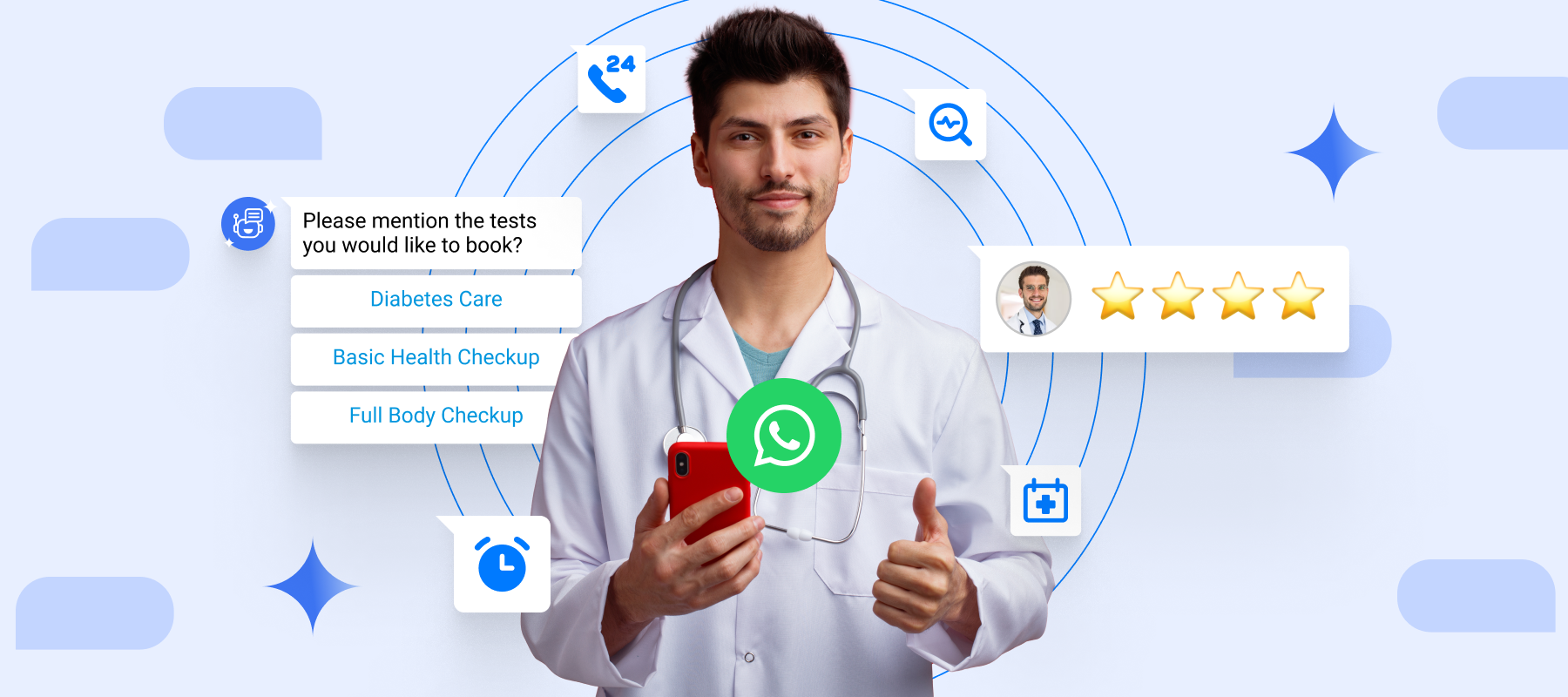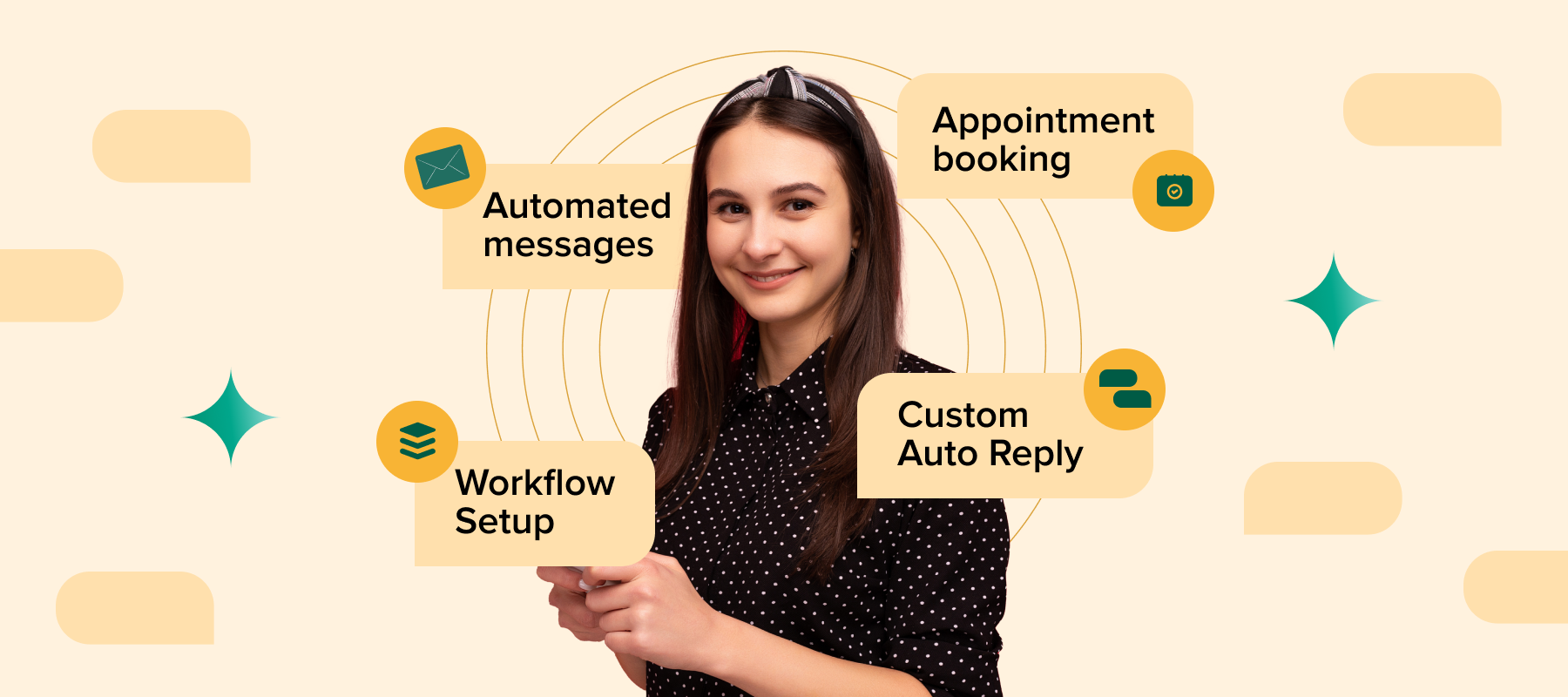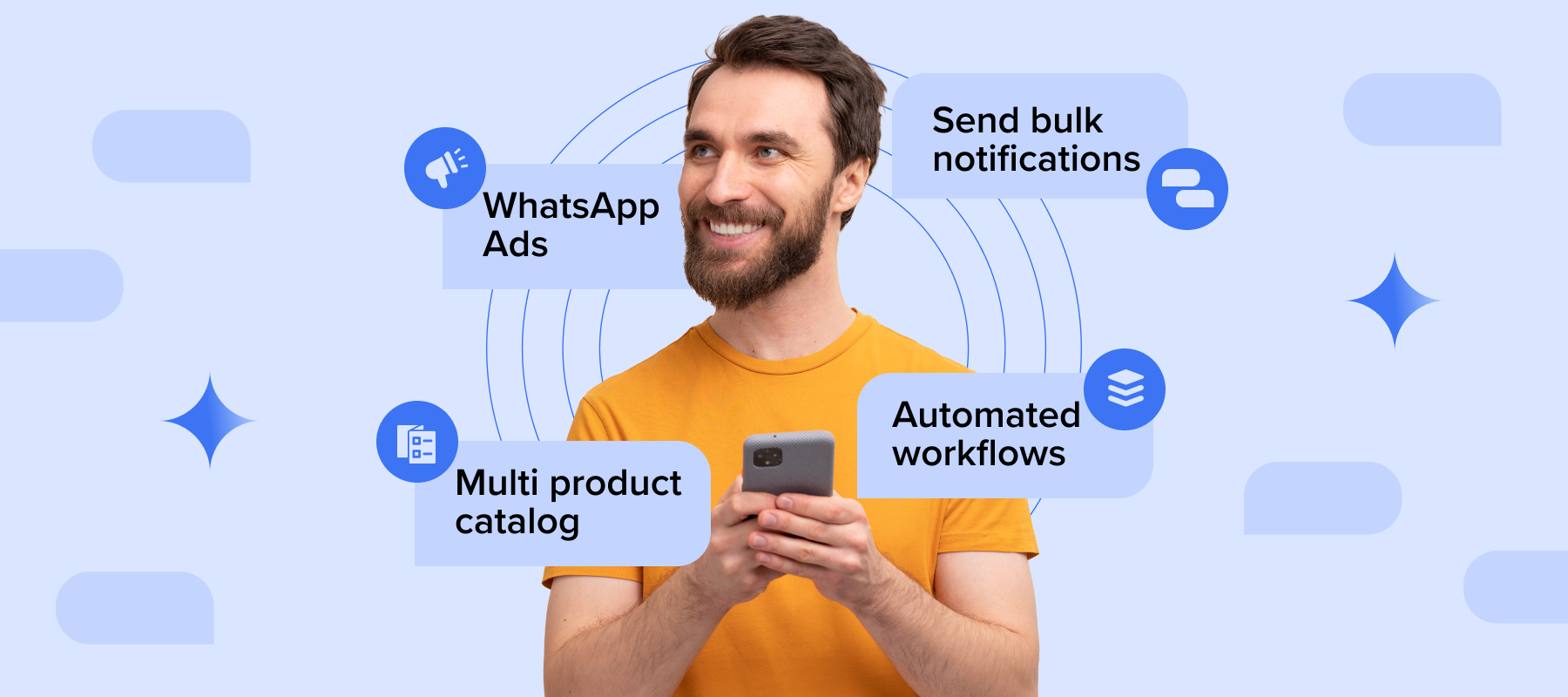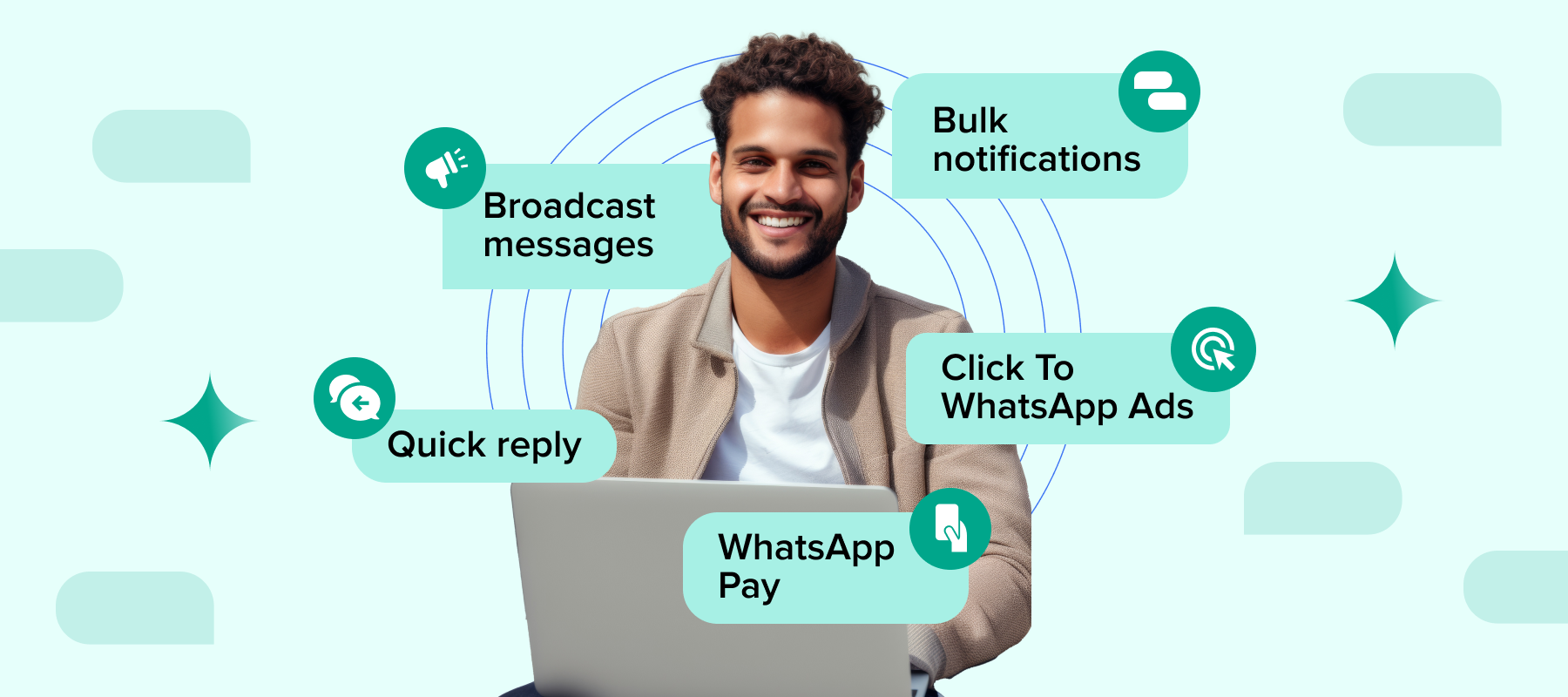Introduction
Healthcare has witnessed remarkable advancements over the past decade: telemedicine, wearable health tech, and AI-driven diagnostics are a few examples. Patients today seek timely updates, personalized guidance, and seamless access to support, reflecting the ubiquity of digital devices and platforms like WhatsApp, enabling real-time communication and maintaining an ongoing dialogue during and after treatment.
By leveraging WhatsApp chatbots, healthcare providers can seamlessly align with this shift, using technology to streamline patient support. Whether they are instant responses to health inquiries, facilitating appointment scheduling, or responding to follow-ups, automation allows for efficient, scalable, and personalized healthcare experiences.
In this article, we’ll explore more about WhatsApp chatbot for healthcare, best implementation practices, and ways to use WhatsApp chatbots in healthcare.
Leveraging WhatsApp Chatbots to Transform Healthcare Operations
The adoption of WhatsApp chatbots in the healthcare industry is a game-changer, enabling providers to bridge gaps in patient communication and operational workflows. With its user-friendly interface and widespread adoption, WhatsApp is ideal for healthcare providers to enhance patient experiences, streamline processes, and provide personalized care.
24/7 availability
24/7, on-demand assistance is expected of businesses across industries, and nowhere is it more necessary than healthcare. WhatsApp chatbots provide patients with instant access to assistance anytime, anywhere. From appointments booking to addressing common concerns like prescription refills or post-care instructions, the chatbot ensures patients can get their queries resolved in real-time.
Proactive, personalized care
Chatbots on WhatsApp can send personalized health tips, reminders for medication or follow-up appointments, and even guide patients through complex processes like insurance claims. This personalized approach fosters trust and helps patients feel more connected to their healthcare providers.
Scalability and efficiency
Hospitals, clinics, and telemedicine platforms often face challenges in managing high volumes of inquiries. A WhatsApp chatbot can efficiently handle a myriad of interactions—ranging from general questions to critical pre-screening processes—allowing healthcare staff to focus on more complex, value-driven tasks.
Integration with existing systems
WhatsApp chatbots can be integrated into Electronic Health Records (EHR), Customer Relationship Management (CRM) systems, or appointment booking tools, ensuring a seamless WhatsApp flow of information across platforms. This minimizes errors, reduces redundancy, and improves overall operational efficiency.
Regulatory compliance and security
Data privacy is of utmost importance in healthcare. It should be ensured that healthcare chatbots comply with healthcare regulations like HIPAA, GDPR, or local data protection laws. These chatbots can encrypt sensitive patient information, ensuring confidentiality while maintaining compliance.
Best Practices for Implementing WhatsApp Chatbots in Healthcare
For successful deployment and adoption of WhatsApp chatbots in healthcare, it is necessary to focus on creating a patient-centric, secure, and efficient system.
Set clear objectives
Before rolling out a WhatsApp chatbot, healthcare providers should identify the specific challenges they aim to address, such as reducing appointment no-shows, streamlining patient support, or providing 24/7 assistance. Having a clear roadmap helps ensure the chatbot aligns with the organization’s goals.
Prioritize data security and compliance
Healthcare data is highly sensitive, and ensuring regulatory compliance is non-negotiable. The chatbot must adhere to standards like HIPAA (for the U.S.), GDPR (in Europe), or local data protection laws. Use end-to-end encryption, secure storage protocols, and obtain explicit patient consent for data usage.
Offer multilingual support
Healthcare companies must serve diverse patient groups who interact in diverse languages, making it essential to deploy a WhatsApp chatbot that offers multilingual support. Not only does a multilingual healthcare chatbot ensure broader accessibility, it enhances patient satisfaction.
Personalize patient interactions
Harness patient data to deliver tailored experiences. From personalized health tips and reminders for medication to follow-up messages post-treatment, personalization fosters trust and engagement while helping align with planned healthcare and treatment.
Focus on simplicity and usability of chatbot
Keep the chatbot design intuitive and easy to navigate. Patients should be able to book appointments, check lab reports, or receive prescription details with minimal effort. Use clear prompts, quick-reply buttons, and concise language for a seamless experience.
5 Ways to Use WhatsApp Chatbots in Healthcare
By leveraging healthcare chatbots on WhatsApp, providers can transform how they engage with patients, streamline operations, and deliver high-quality care. Whether it’s simplifying appointment management, offering multilingual support, or driving preventive health initiatives, the possibilities are virtually endless.
Streamlining appointment management
Managing appointments can be a logistical challenge for healthcare providers, often leading to inefficiencies and patient dissatisfaction. WhatsApp chatbots for healthcare simplify this process by automating appointment booking, rescheduling, and reminders.
Patients can interact with the chatbot to view available time slots, select their preferred options, and receive instant confirmations. Automated reminders reduce no-shows, ensuring better resource utilization. Additionally, the chatbot can help patients prepare for appointments by sharing pre-visit instructions, making the process more streamlined and patient-friendly.
Always-on patient support
Healthcare is a round-the-clock service, and patients often seek answers to their concerns outside regular hours. WhatsApp chatbots act as a virtual help desk, available 24/7 to answer common queries like clinic hours, services offered, and doctor availability.
For more critical concerns, the chatbot can provide initial guidance or triage the issue before escalating to a medical professional if needed. By offering instant responses, WhatsApp chatbots ensure patients feel supported and valued at all times, enhancing overall satisfaction.
Enhanced health monitoring
Adherence to prescribed treatments is essential for positive health outcomes, yet many patients struggle with medication schedules. WhatsApp chatbots play a crucial role in reminding patients to take their medications, refill prescriptions, or follow specific treatment plans.
Beyond reminders, chatbots can collect patient-reported data, such as symptoms or side effects, enabling real-time monitoring of chronic conditions. This data can be shared with healthcare providers to make informed decisions, creating a proactive approach to patient care.
Preventive healthcare campaigns
We’ve all heard the adage that prevention is better than cure. WhatsApp chatbots enable providers to launch personalized preventive healthcare campaigns, such as promoting vaccinations, health screenings, or wellness programs.
Patients can receive tailored messages based on their age, gender, and medical history, encouraging them to take proactive steps for their health. For example, during flu season, a chatbot can send reminders about flu shots, share educational resources, or answer vaccine-related questions. These campaigns foster a culture of preventive care, benefiting both patients and providers.
Multilingual capabilities
Healthcare chatbots with multilingual capabilities can serve customers who speak different languages and dialects. For example, patients can inquire about their test results, understand complex medical instructions, or ask about insurance coverage in a language they’re comfortable with. This feature is especially valuable in regions with significant linguistic diversity. While deploying a healthcare chatbot on WhatsApp, a rule of thumb is to integrate it with languages most commonly used in the region.
Conclusion
WhatsApp chatbots in healthcare enable patient-centric, efficient, and accessible care at scale. They address key challenges such as appointment management, adherence to prescribed medication, multilingual communication, and preventive health engagement – on a platform that patients already trust and use daily. With thoughtful implementation and a commitment to enhancing patient experiences, WhatsApp chatbots are the future of healthcare.






